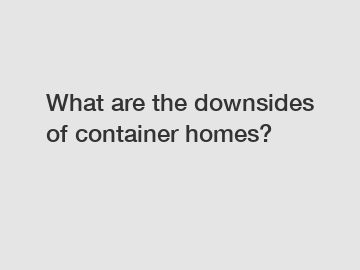What are the downsides of container homes?
Container homes have been gaining popularity in recent years as a sustainable and cost-effective housing option. However, like with any housing choice, there are downsides to consider before taking the plunge into container living. In this article, we will discuss some of the potential drawbacks of container homes.
Limited Space.
One of the main downsides of container homes is their limited space. Shipping containers have a fixed size and shape, which can make it challenging to create a spacious and functional living environment. This can be especially problematic for families or individuals who require more room to live comfortably.

Insulation Issues.
Another downside of container homes is their poor insulation. Shipping containers are made of metal, which means they can get extremely hot in the summer and cold in the winter. This can result in higher energy bills as you try to heat or cool your home. Additionally, poor insulation can lead to condensation and mold issues, which can be harmful to your health.
Limited Design Options.
Container homes offer limited design options compared to traditional homes. The industrial look of shipping containers may not appeal to everyone, and it can be challenging to customize the exterior of your home. Additionally, the size and shape of containers can make it difficult to create unique layouts and floor plans.
Permitting and Zoning Challenges.
Building a container home can present challenges when it comes to permits and zoning regulations. Some areas may have strict guidelines for building with shipping containers, or they may not allow container homes at all. Before deciding to build a container home, it's essential to check with your local government to ensure you can legally construct and live in a container home.
Durability Concerns.
While shipping containers are designed to withstand the harsh conditions of sea travel, they may not be as durable when used as a permanent residence. Over time, rust and corrosion can weaken the structure of the container, leading to potential safety hazards. Regular maintenance is essential to keep your container home in good condition and prevent costly repairs down the road.
Limited Resale Value.
Container homes may have limited resale value compared to traditional homes. The unique nature of container homes may appeal to a niche market, which can make it challenging to find a buyer when it comes time to sell. Additionally, the stigma surrounding container homes may deter potential buyers who prefer more conventional housing options.
In conclusion, while container homes offer many benefits, including sustainability and affordability, it's essential to consider the downsides before making the decision to live in a container home. Limited space, insulation issues, design limitations, permitting challenges, durability concerns, and resale value are all factors to consider. If you're still interested in exploring the possibility of living in a container home, be sure to do your research and work with a reputable supplier who can help address these potential drawbacks. Contact us today to learn more about container homes and how we can help you create your dream living space.
The company is the world’s best Easy install Container House Price, modular prefab prefabricated shipping container house home, steel structure cattle house supplier. We are your one-stop shop for all needs. Our staff are highly-specialized and will help you find the product you need.

Comments
0